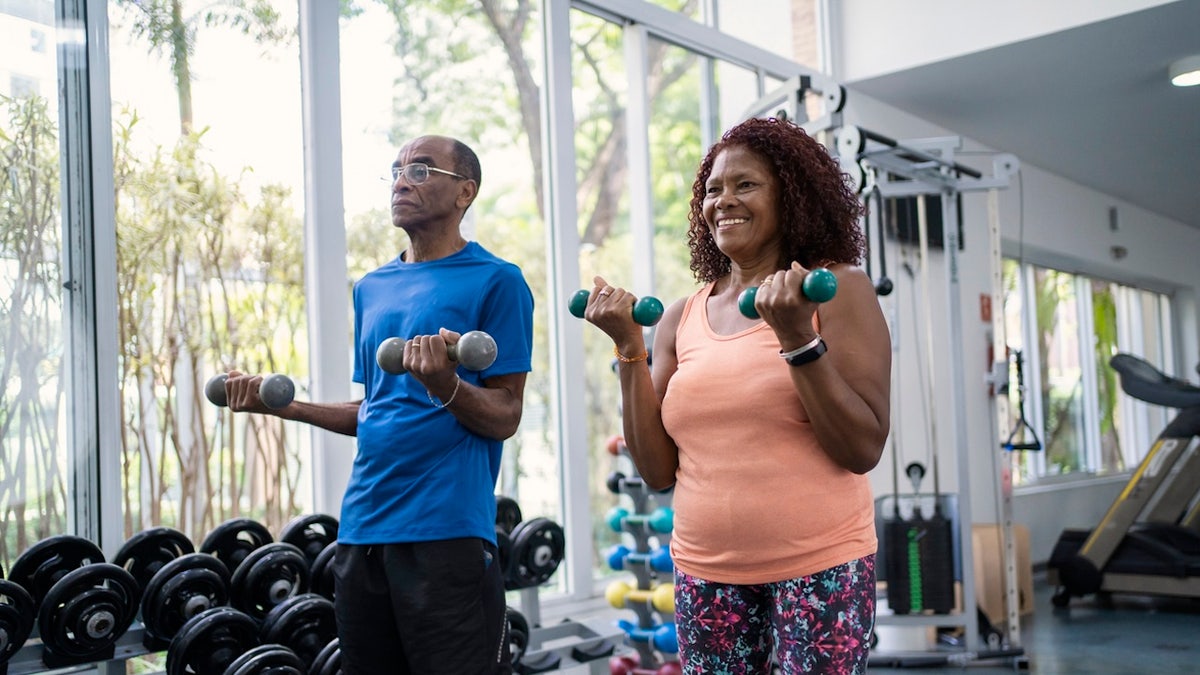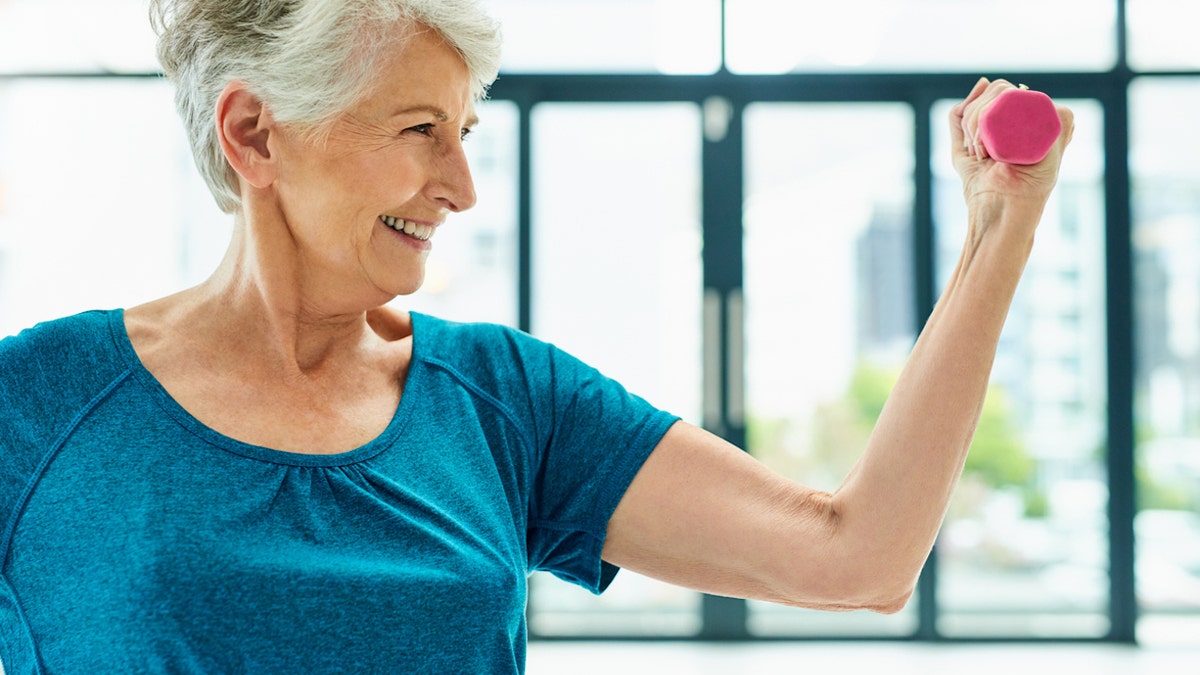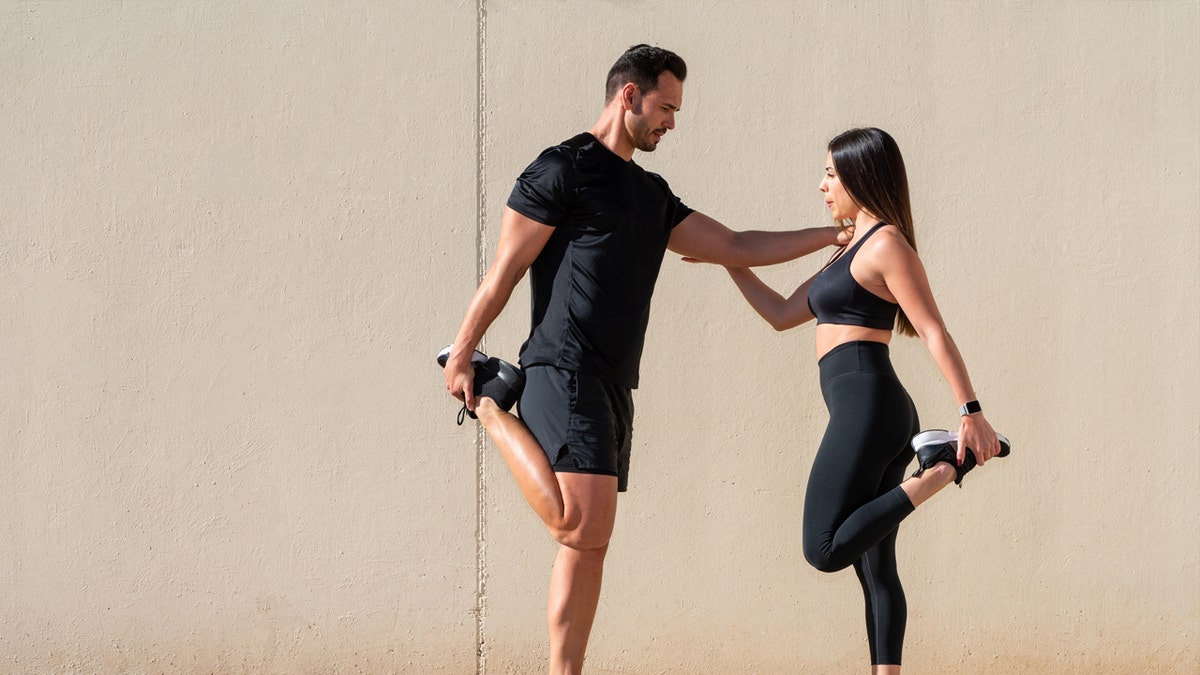When it comes to reaping the rewards of exercise, women may have a leg up.
A new study published in the Journal of the American College of Cardiology found that females may get more benefits than men when doing the same amount of physical activity.
Researchers from the Smidt Heart Institute at Cedars-Sinai in Los Angeles analyzed the physical activity data of 412,413 U.S. adults.
KIDS WHO WEAR SCHOOL UNIFORMS GET LESS PHYSICAL ACTIVITY, STUDY FINDS: ‘THERE’S A PROBLEM’
The participants all responded to the National Health Interview Survey database between 1997 and 2019, providing details about the frequency, duration, intensity and type of physical activity, according to a press release from the hospital.
In terms of cardiovascular exercise, the researchers found that men gained their maximum “survival benefit” from doing “moderate to vigorous aerobic physical activity” for about five hours per week.
For women, that same level of benefit was achieved after just 2½ hours of that exercise intensity per week.
Women continued to gain more benefits after that time, however.
THE MORE PEOPLE EXERCISE, THE LAZIER THEY ARE THROUGHOUT THE REST OF THE DAY, STUDY SUGGESTS
Examples of “moderate to vigorous aerobic physical activity” include brisk walking or cycling, the study detailed.
For strength training exercises, men hit their maximum benefit from three weekly sessions, while women achieved the same outcome with just one session per week.
“We found not only that progressively greater amounts of physical activity reduced mortality risk, but also that the amount of regular exercise needed to achieve the same degree of risk reduction was different in females versus males,” said senior author Susan Cheng, M.D., MPH, director of the Institute for Research on Healthy Aging in the Department of Cardiology in the Smidt Heart Institute.

“In effect, women did not need to exercise for as much time as men to achieve the same benefit,” she told Fox News Digital.
“Put another way, for a given amount of time and effort put into exercise, women had more to gain than men.”
Co-lead author Martha Gulati, M.D., director of preventive cardiology in the Department of Cardiology at the Smidt Heart Institute at Cedars-Sinai, noted in the release that women have historically and statistically lagged behind men in engaging in exercise.
“Exercise doesn’t discriminate, no matter your gender. You have to put the work in to be healthy.”
“The beauty of this study is learning that women can get more out of each minute of moderate to vigorous activity than men do,” Gulati said.
“It’s an incentivizing notion that we hope women will take to heart.”
While mortality risk decreased for all adults, it was reduced by 24% for women and 15% for men, according to Cheng.

“We hope that the results of this study will help to motivate females who are not currently engaged in regular physical activity to understand that they are in a position to gain substantial benefit, technically even more than their counterpart males, for each increment of regular exercise they are able to invest in their longer-term health,” Cheng told Fox News Digital.
“Part of what makes females and males different is that when it comes to living longer and living healthier, different types of investments are linked to different types of gains.”
ADHD IN MALES VERSUS FEMALES: WHAT YOU MUST KNOW ABOUT THE DIFFERENCES IN SYMPTOMS AND TREATMENTS
The researchers hope that these findings will help women who may feel too busy or too intimidated to take on a new exercise routine without feeling that they have to compare themselves to men.
“They can be on their own path to success and every bit of progress will count,” Cheng said.

Chris Pruitt, a certified personal trainer with the American Sports and Fitness Association (ASFA) who is based in Maryland, was not involved in the study but said it aligns with observations that women and men may require different approaches to achieve similar health outcomes.
“In my experience, individual responses to exercise can vary widely, and it’s fascinating to see this backed by research,” he told Fox News Digital.
“Biological differences between genders, including hormonal variations and body composition, likely play a significant role in these observed differences,” Pruitt went on.
“Women may use energy or recover from exercise differently than men, leading to these distinct benefits from less exercise.”
5 WAYS TO STICK WITH YOUR ‘EXERCISE MORE’ NEW YEAR’S RESOLUTION IN 2024, FROM A NEW YORK DOCTOR
This research illustrates the importance of personalized fitness programs that consider gender differences, he said.
“It suggests that fitness advice should be more tailored to the individual’s goals and abilities and their gender-specific physiological responses to exercise.”
Potential limitations
The chief limitation of the study is that all physical activity data was self-reported — which creates the possibility for inaccuracies.
“In the future, direct measures of exercise could be analyzed using wearable devices,” Cheng said.

“A very large study of people whose exercise is digitally tracked and measured could one day give us even more detailed information on differences not only between women and men, but also within women and within men.”
“There is still a lot more work we need to do to figure out how to best tailor exercise recommendations to each individual person to best meet their individual needs.”
CLICK HERE TO SIGN UP FOR OUR HEALTH NEWSLETTER
Josh York, founder and CEO of the New York-based fitness training company GYMGUYZ, reviewed the study and said he does not think the findings should influence people’s fitness routines.
“There are a lot of things you need for good health and fitness, including proper nutrition and a healthy lifestyle,” he told Fox News Digital.
“There are a lot of different variables at play when it comes to assessing a person’s exercise needs and requirements.”

While the study looked at maximal survival benefit, York noted that some people might be motivated by other goals, such as looking a certain way.
“At the end of the day, exercise doesn’t discriminate, no matter your gender,” he said. “You have to put the work in to be healthy. If someone puts more work in, has a healthy diet and lives in a safe environment, they are going to get better results, because physical health is influenced by your habits and mental well-being.”
As each individual is different, York said that “sweeping assumptions” about each gender’s exercise needs and outcomes don’t take into account variations in individuals’ circumstances.
“I don’t think people should use this as guidance to reduce their exercise regimens,” he said.
For more Health articles, visit www.foxnews.com/health.
Read the full article here